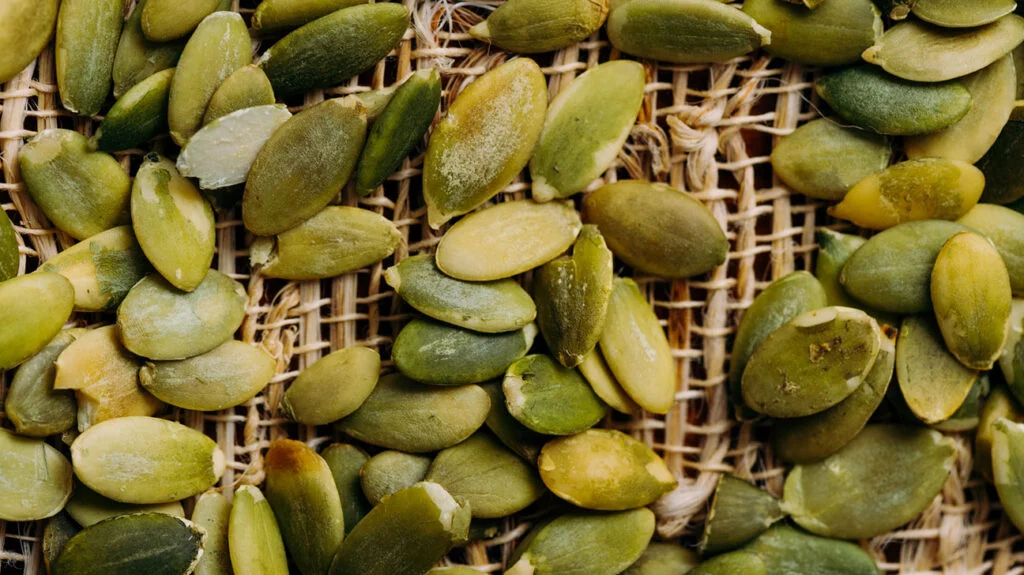- 0086-571-85302990
- sales@greenskybio.com
Pumpkin Seeds vs. Chia Seeds: Which Suits Your Nutritional Needs?
2025-10-17

Both pumpkin and chia seeds are nutritious additions to a balanced diet, offering distinct benefits depending on your dietary goals. While one isn't categorically "better" than the other, each excels in different areas like fiber, protein, and magnesium.
Nutritional Comparison
Chia Seeds (1 oz):
Calories: 140
Protein: 4-5 g
Fat: 9 g
Carbohydrates: 12 g
Fiber: 10-11 g
Magnesium: 111 mg
Calcium: 212 mg
Zinc: 2 mg
Iron: 2 mg
Pumpkin Seeds (1 oz):
Calories: 160
Protein: 9 g
Fat: 14 g
Carbohydrates: 5 g
Fiber: 2 g
Magnesium: 150 mg
Calcium: 15 mg
Zinc: 2-3 mg
Iron: 2-3 mg
Fiber Content: Chia Seeds Stand Out
For those looking to enhance their fiber intake, chia seeds are an excellent option. Containing 10 grams of fiber per ounce, chia seeds provide more than one-third of the daily recommended intake. The high fiber content aids satiety, improves digestive function, and helps regulate blood sugar levels. Additionally, chia seeds are a rich source of omega-3 fatty acids, which contribute to cardiovascular health, reduce inflammation, and support brain function. Furthermore, chia seeds have more calcium than pumpkin seeds, benefiting bone health.
Protein and Magnesium: Pumpkin Seeds Shine
Pumpkin seeds, on the other hand, are more protein-dense, offering 9 grams of protein per ounce. This protein content supports cellular repair and overall body function. Pumpkin seeds also provide slightly more magnesium than chia seeds, with magnesium playing a critical role in nerve and muscle function, blood pressure regulation, and glucose control. In addition to magnesium and protein, pumpkin seeds are a good source of vitamin E, which contributes to anti-inflammatory benefits.
Choosing Between Chia and Pumpkin Seeds
Deciding which seed to incorporate into your diet depends on your specific health goals:
Chia Seeds: Ideal for those focusing on glycemic control, cardiovascular, bone, and digestive health due to high fiber and omega-3 content.
Pumpkin Seeds: Great for boosting protein, minerals, prostate health, sleep quality, and immune function.
Consider integrating both into your diet to leverage their complementary benefits. However, when consuming chia seeds dry, be mindful of potential choking hazards and gastrointestinal discomfort—opt to mix them into dishes with wet ingredients for safe consumption.
Ultimately, both chia and pumpkin seeds offer unique contributions to nutritional health, allowing for versatility in catering to personal dietary needs.
- ▶ Hesperidin
- ▶ Citrus Bioflavonoids
- ▶ Plant Extract
- ▶ lycopene
- ▶ Diosmin
- ▶ Grape seed extract
- ▶ Sea buckthorn Juice Powder
- ▶ Fruit Juice Powder
- ▶ Hops Extract
- ▶ Artichoke Extract
- ▶ Mushroom extract
- ▶ Astaxanthin
- ▶ Green Tea Extract
- ▶ Curcumin
- ▶ Horse Chestnut Extract
- ▶ Other Product
- ▶ Boswellia Serrata Extract
- ▶ Resveratrol
- ▶ Marigold Extract
- ▶ Grape Leaf Extract
- ▶ New Product
- ▶ Aminolevulinic acid
- ▶ Cranberry Extract
- ▶ Red Yeast Rice
- ▶ Red Wine Extract
-
Red Date Extract
2025-10-17
-
Nettle leaf extract
2025-10-17
-
Acerola Juice Powder
2025-10-17
-
Coix Seed Extract
2025-10-17
-
Red Wine Extract
2025-10-17
-
Saponin Extract
2025-10-17
-
White mustard seed extract
2025-10-17
-
Baicalin
2025-10-17
-
Artichoke Extract
2025-10-17
-
Sugarcane Extract
2025-10-17





















